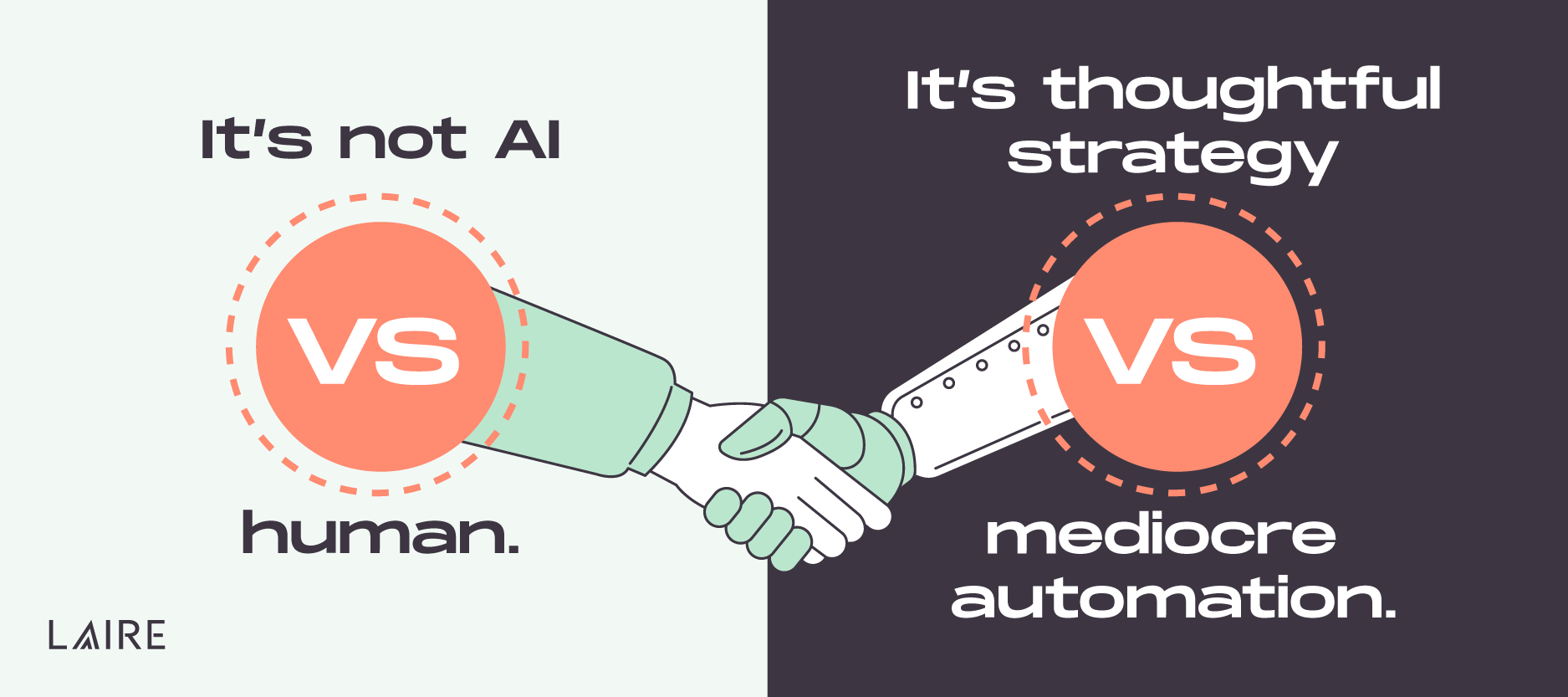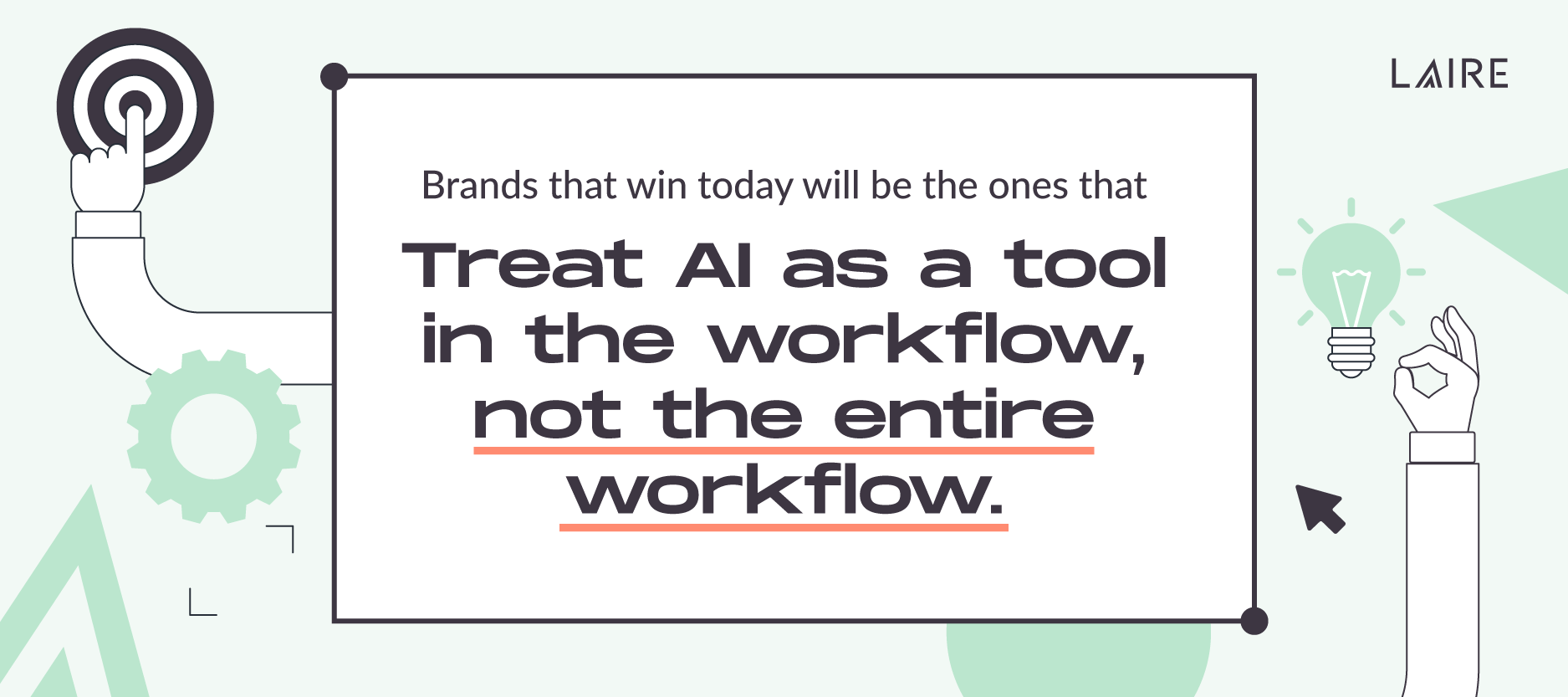TABLE OF CONTENTS
The Quantity Trap | Google’s Position on AI Content | E-E-A-T | Balancing AI & Human Touch |
Proving True SEO Value
Picture this all-too-familiar scenario…
You’re leading the quarterly marketing meeting, and you’re about to walk the team through the numbers. Organic sessions are down by a whopping 50% year-over-year, but you’ve got a silver lining: conversions are holding steady, bounce rate is trending better, and engagement time is inching up.
You look around the room, and the team that has come to expect organic traffic to steadily rise isn’t pleased. They’ve invested years building a mature SEO strategy rooted in brand authority, topical depth, and consistent output. And yet here you are, in 2025, with zero growth in organic search clicks.
“So,” they say, “what's the plan? Can we scale this with AI content and hit our traffic targets next quarter?”
But as the SEO expert in the room, you think: Is it really just about a prompt, a publish button, and a spike in output? Could AI-generated blog posts alone equal SEO value?
You know the answer. And in this article, we’ll walk you through why AI-generated blog content doesn’t equal SEO value, what the risks are, and how to reclaim real, durable SEO capital rather than chasing volume.
The Quantity Trap: Why “More Content Faster” ≠ Better Rankings
We get it — when traffic drops, the instinct is to publish more. Fast. But here’s the problem: volume doesn’t equal visibility anymore.
So, is AI-generated content bad for SEO? Not necessarily. That said, it has a short SEO shelf life. Why? Because Google’s algorithm favors fresh, original insights from credible sources, not recycled or generic information.
Think about it this way: If thousands of websites are all using the same AI tool to answer the same query, they’re all producing nearly identical content. Google has gotten sophisticated at detecting this “semantic sameness.”
So, when your blog post sounds like everyone else’s, you’re not offering anything new. And if you're not offering anything new, why would Google rank you?
The misconception that more content equals better rankings is exactly what’s tanking so many SEO strategies right now. You might see a temporary bump in indexed pages, but watch what happens to traffic over time. Those AI-generated posts rank fast… and decay even faster.
Consider this real-world test from one SEO leader: “After three months of an AI-content experiment (publish one blog post per day, automatically through WordPress), my client’s site traffic crashed 70%.”
Remember: Speed without strategy is just noise. And Google is listening.
Google’s Real Position on AI Content
Now, Google doesn’t hate AI content.
According to official guidance from Google, AI use is perfectly fine — if the purpose is helpfulness and quality, not manipulation.
So, it doesn’t matter whether the content is written by a human or an AI. What matters is whether it serves the user.
But here’s the catch: Google now detects low-novelty content signals. If your content lacks original insights, firsthand experience, or proprietary data, it’s flagged as low-value (regardless of how it was created).

You can use AI tools all day long. But if you're just automating mediocrity, you're not building SEO value. You're building an ignorable content library.
The Missing E-E-A-T Strategy Layer
Google’s E-E-A-T framework (Experience, Expertise, Authoritativeness, and Trustworthiness) is the foundation of how content gets evaluated, especially in competitive niches. And AI cannot deliver on these signals alone. Let’s break it down:
Experience
AI lacks a firsthand perspective. It can’t tell you what it’s like to implement a marketing strategy, troubleshoot a technical issue, or navigate a client relationship. It can only synthesize what others have written about those experiences.
Expertise
AI cannot cite proprietary data, original research, or lived insights. It doesn’t have access to your company’s case studies, your team’s unique methodologies, or the lessons learned from years in the trenches.
Authoritativeness
Authority is earned through external recognition. This means backlinks, citations, brand mentions, and thought leadership. AI doesn’t build your reputation. Humans do.
Trustworthiness
Human editorial oversight, brand voice consistency, and transparency prove authenticity. AI output, without human review, often feels generic, impersonal, and (honestly) untrustworthy.
If you’re publishing AI-generated content without layering in human strategy, subject matter expertise, and editorial rigor, you’re essentially publishing content that Google has no reason to trust or promote.
Without human input, AI output fails to meet E-E-A-T standards. It’s a lot like serving up food without any nutritional value. It’s a meal without the game-changing ingredients: human awareness, experience, and topical authority.
Without it, you have nutrient-starved content (and it’s not doing your website any favors).
Human + AI: The Strategic Middle Ground
So, does this mean you should abandon AI altogether? Absolutely not. Ask yourself: How can AI assist with my strategy?
What you need is an AI-assisted SEO production loop, not an AI-generated content factory. Here’s what that looks like in practice:
- Human defines the brief and search intent. You start with strategy. What question are you answering? What insight are you offering that no one else can? What’s the user really searching for?
- AI drafts → strategist enhances → SME reviews. AI can help you get to a first draft faster. But then a strategist refines it for clarity, positioning, and SEO optimization. Finally, a subject matter expert (SME) adds proprietary insights, real-world examples, and credibility.
- Output is optimized around information gain metrics. You’re not just publishing content. You’re publishing content that moves the needle on engagement, dwell time, and backlink acquisition.
This is the difference between “AI-generated” and “AI-accelerated” content systems. One replaces humans. The other amplifies them.

Proving True SEO Value
Let’s talk about what real SEO value actually looks like.
When done effectively, a solid SEO strategy produces a compounding effect. Your content continues to perform over time.
True SEO value shows up in:
- Engagement metrics: Time on page, scroll depth, internal link clicks
- Link acquisition: Other sites citing your content as a resource
- SERP (search engine result page) durability: Your rankings holding steady (or improving) months after publication
The problem with most AI blogs is that they decay as quickly as they rank, like unrefrigerated milk. They lack the depth, originality, and authority that make content durable.
Case in point: the SEO leader we mentioned earlier saw traffic crash by 70% after flooding his site with daily AI-generated posts. Why? Because none of his posts earned links. None of them sparked conversation. None of them positioned the brand as a trusted authority.
Real SEO value equals content that compounds — content that people reference, share, and return to.
The Bottom Line
The web is drowning in AI-generated content, and volume alone won’t save your SEO strategy. Google is evolving. Users are evolving. So, your content strategy needs to evolve, too.
AI-generated blog content doesn’t equal SEO value unless it’s paired with human strategy, subject matter expertise, and a commitment to E-E-A-T principles. The brands that win won’t be the ones publishing the most content. They’ll be the ones publishing the most meaningful content.
So, if you’re ready to build an SEO system that scales expertise (not just output), let’s talk. At LAIRE, we help brands navigate the intersection of AI and human-centered strategy, so you can drive real results without losing your voice.
Check out how LAIRE can help implement AI-powered growth systems tailored to your business.


